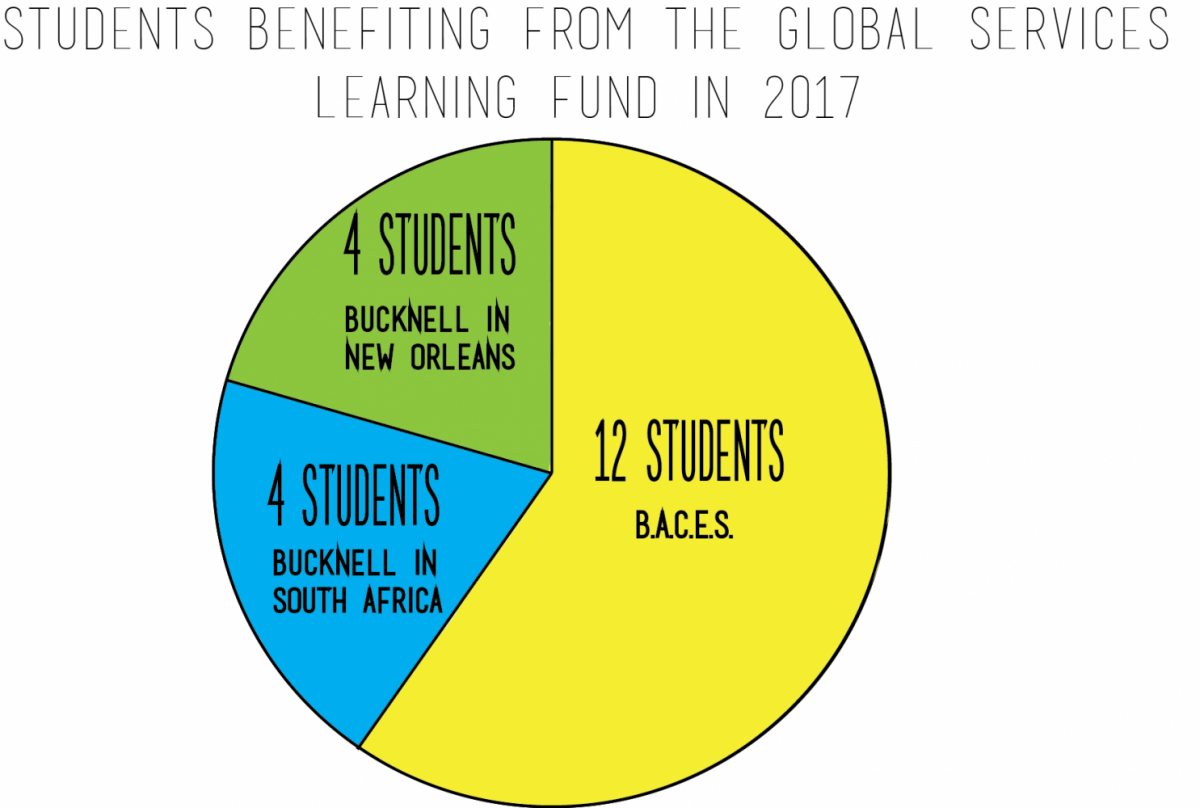Evaluating the benefits of funds in global education and service
September 28, 2017
This past summer, the University was notified that the Global Service Learning Fund, which benefits students in both credit-baring summer programs and the alternative break trip B.A.C.E.S. (Bucknell Advocating Communities: Educating and Serving), would not be replenished by the previous donor. Now, the fund will go dry.
The fund was created in 2015, when David and Miranda Lind pledged a gift of $50,000 to be used over two years in support of student participation in service learning trips. The donors are parents of Colin Lind ’15, an International Relations major who was a student leader for B.A.C.E.S. during his time at the University.
Janice Butler, the Director of Civic Engagement & Service-Learning, was involved in creating a committee to oversee applications and a set of procedures required to receive aid from the fund. Students who are a part of the B.A.C.E.S. program received up to $500, Butler said, and additional funds were available for students on longer credit-bearing terms. All amounts of scholarships only made up a portion of the required cost for the service learning trips and were awarded on a need basis.
In a letter sent to David and Miranda Lind, Butler stated, “I know, as a facilitator of service-learning experience, that these types of educational opportunities can have a significant impact on our volunteers. I am so appreciative that students with financial needs have access to these eye-opening exchanges.”
In 2017, 20 students benefited from the fund. Twelve students participated in the B.A.C.E.S. spring break program; four participated in “Addressing the Legacy of Apartheid: Social Entrepreneurship and Community Development,” a three week course in Cape Town, South Africa; and four students participated in “New Orleans in 12 Movements,” an inter-disciplinary course on the multi-cultural port city’s history, music, culture, infrastructure and renaissance.
All students who received aid from the fund were required to complete a public dissemination project with the intent that sharing individual experiences “may encourage others to undertake similar civic responsibility,” as stated in the previous Service-Learning Experience Fund Application. Students receiving aid could complete this requirement in a variety of ways, including a blog, a radio broadcast, an article in a newsletter, or a presentation to an off-campus group of 10+ people.
According to Trace Coats, a University Global Education Advisor and the B.A.C.E.S trip’s advisor, approximately 50-60 percent of B.A.C.E.S. participants, aside from student leaders, received aid from this fund in the last two years. He said that other ways to offset the payment of the trip in the past years has included allowing students to make payments incrementally. In the past ten years Coats has been involved with the B.A.C.E.S. program, the amount of students who have needed aid has continually increased.
According to Butler, B.A.C.E.S also receives yearly appropriations for the University’s student government and independent fundraising. Butler added that B.A.C.E.S. was offered an invitation to join the University as a division, but declined in order to maintain student organization status, resulting in an irregular budget.
Coats addressed the student organization’s status as being beneficial to students. “I think it’s an excellent way for students to develop leadership skills, especially when they stick around and become leaders of the organization. They’re the ones running the show,” Coats said.
“I think it is unusual that an institution like Bucknell does not have direct scholarships for study abroad for both the short term programs and the semester programs,” Coats added.
Peer institutions, ike the University of Richmond, offer numerous international education scholarships, many of which are merit based. Similarly, Villanova University offers an array of name scholarships for students studying abroad.
Jemmy Moreira ’20, a current trip leader for B.A.C.E.S., who received aid from the fund last year, believes that the absence of the fund will impact the service learning trip.
“The scholarship gave students from all income-levels the opportunity to do something they are passionate about without worrying about financial constraints,” Moreira said. “The diversity of the B.A.C.E.S. trip is one of the best assets by far. Our participants are a great representation of Bucknell because it encompasses all identities on this campus.”
“The Office of Financial Aid does have limited need-based aid for summer study abroad programs, and we have been able to award it to needy students for a number of years,” Andrea Leithner Stauffer, Director of Financial Aid said.
According to the University website, Kitty McDonnell Pipoli ’94 recently pledged $7.5 million through a commitment from her family trust to expand global education at the University by creating and endowing the Bucknell Global Scholars Program.
“The new Global Education fund will be available beginning in Fall 2018. It will be awarded on the basis of need, and conversations continue regarding additional details as to how it will be administered,” said Stauffer.
There is limited money left in the fund, which will be used this year. $1,000 from the leftover amount will be given to B.A.C.E.S. and the rest will be given to other credit-bearing programs.
Kathy Graham Associate Vice President for Development & Alumni Relations said, “We continue to speak with potential donors about the need for additional funding for these types of trips, and hopefully we will be successful in raising more funds for global service learning trips in the future.”






















